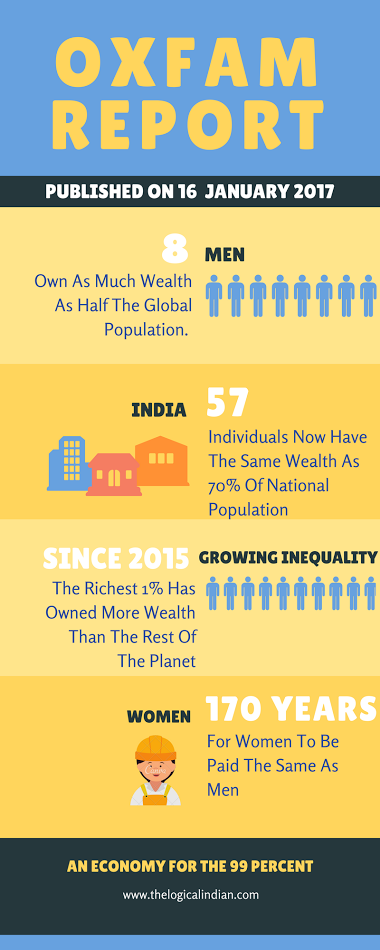
8 Individuals Own As Much Wealth As 50% Of The World Population: Oxfam Report
16 Jan 2017 9:30 AM GMT
In a report on global inequality released on 16 January 2017, the international confederation Oxfam discovered that eight men own the same wealth as half the global population.
The report is titled “An Economy For The 99 Percent”. It was released ahead of an annual meeting of the World Economic Forum. According to the report’s findings, the gap between the rich and the poor is far greater than had been feared.
The eight men who hold the same wealth as 50% of the global population
- Bill Gates (American, founder of Microsoft),
- Amancio Ortega (Spanish, founder of Inditex),
- Warren Buffett (American, CEO of Berkshire Hathaway),
- Carlos Slim Helu (Mexican, owner of Grupo Carso),
- Jeff Bezos (American, Chairman of Amazon),
- Mark Zuckerberg (American, CEO of Facebook),
- Larry Ellison (American, CEO of Oracle)
- Michael Bloomberg (American, CEO of Bloomberg LP).8 Individuals Own As Much Wealth As The Rest Of Humanity: Oxfam Report
Here are a few of the key findings of the report:
- Tax evasion, political corruption, and the driving down of wages by big businesses and the super-rich are fuelling an inequality crisis.
- The richest 1% has owned more wealth than the rest of the planet since 2015.
- 70% people live in a country that has seen a rise in inequality in the last 30 years.
- Between 1988 and 2011, the incomes of the poorest 10% increased by just $65 per person while the incomes of the richest 1% grew by $11,800 per person – 182 times as much.
- At the current rate, it will take 170 years to achieve equal pay for men and women.
- The super-rich also avoid paying their share of taxes by using tax havens and they also secure high returns on their investments with the help of their wealth managers. Services that are not easily available to ordinary citizens.
- Many of the super-rich are not ‘self-made’. Over half of the billionaires inherited the wealth or accumulated it by investing in industries which have rampant corruption and cronyism.
- The big businesses and organisations use their power and money to ensure that the government policies work in their favour. For example, billionaires in Brazil have sought to influence elections and successfully lobbied for a reduction in tax bills while oil corporations in Nigeria have managed to secure generous tax breaks.
- In country-wise analyses, over the last 30 years, in the United States of America, the income growth of the bottom 50% has been zero, whereas the top 1% have seen an income increase of 300%. In Vietnam, the richest man in the country earns more in one day than what the poorest person makes in one decade.
- The top 1% has earned more income in the last 25 years than all of the bottom 50% put together.
- From Brexit to the success of Donald Trump’s presidential campaign, a worrying rise in racism and the widespread disillusionment with mainstream politics, there are increasing signs that more and more people in rich countries are no longer willing to tolerate the status quo.
- Millions of people have been lifted out of poverty in recent decades, an achievement of which the world should be proud. Yet, one in nine people still goes to bed hungry.
- Three-quarters of extreme poverty could, in fact, be eliminated using existing resources, by increasing taxation and cutting down on military and other regressive spending.
- The total global wealth is $255.7 trillion.
How does India fare?
- India’s richest 1% now holds 58% of India’s total wealth (the global figure is about 50%).
- 57 billionaires in India now have same wealth ($ 216 billion) as that of the bottom 70% population of the country.
- There are 84 billionaires in India, with a collective wealth of $ 248 billion, led by Mukesh Ambani, Dilip Shanghvi, and Azim Premji.
- The total Indian wealth is $3.1 trillion.
Remedies
Oxfam suggested many methods to combat the rising global economic inequality.
According to Oxfam, we need to design businesses and economies in a way to ensure that excess wealth is not generated in the first place. This, they suggest, can be done by things like setting limits on the income of the top people, and by encouraging business models that do not provide undue rewards to shareholders. Second, steps need to be taken to end the undue influence of elites over politics and the economy.
Beyond these actions, the main tool for eliminating excessive wealth is taxation. Oxfam advised that top rates of income tax be raised in almost every country. Oxfam called for “a fundamental change in the way we manage our economies so that they work for all people, and not just a fortunate few”.
 All section
All section














